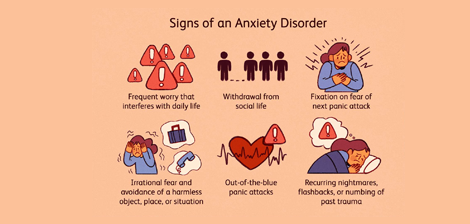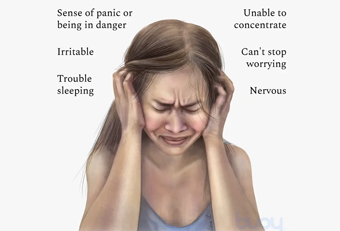
Anxiety is a mental health condition that affects millions of people worldwide. It is characterized by persistent feelings of fear, worry, and apprehension that can interfere with an individual’s ability to function in daily life. Anxiety can range from mild to severe and can be a chronic condition. It is important for individuals who are experiencing symptoms to seek help from a mental health professional.
Symptoms of Anxiety
The symptoms of anxiety can vary from person to person, but some common symptoms include:
- Excessive worry or fear about everyday situations
- Restlessness or feeling on edge
- Difficulty concentrating
- Fatigue and lack of energy
- Muscle tension or aches
- Difficulty sleeping or sleeping too much
- Rapid heart rate or shortness of breath
- Avoidance of situations that trigger anxiety
Causes of Anxiety
Anxiety is a complex condition, and there is no one cause. It is likely caused by a combination of genetic, environmental, and psychological factors. Some potential causes of anxiety include:
- Genetics: Anxiety can run in families, and researchers have identified certain genes that may increase the risk of developing anxiety.
- Brain chemistry: Anxiety is thought to be related to an imbalance of certain chemicals in the brain, such as serotonin and dopamine.
- Environmental factors: Trauma, abuse, and stressful life events can increase the risk of developing anxiety.
- Medical conditions: Certain medical conditions, such as heart disease or respiratory disorders, can increase the risk of anxiety.
- Substance abuse: Alcohol and drug abuse can contribute to anxiety.
- Difficulty sleeping or sleeping too much
- Rapid heart rate or shortness of breath
- Avoidance of situations that trigger anxiety
Treatment of Anxiety
There are several effective treatments for anxiety, including medication, psychotherapy, and lifestyle changes. Treatment will depend on the severity of the anxiety and the individual’s unique needs.
Medication: Antidepressant and anti-anxiety medications are commonly used to treat anxiety. These medications work by balancing the levels of chemicals in the brain that are related to mood and anxiety. It can take several weeks for the medication to take effect, and it is important to work with a mental health professional to find the right medication and dosage.
Psychotherapy: Psychotherapy, or talk therapy, is another effective treatment for anxiety. Cognitive-behavioral therapy (CBT) is a type of psychotherapy that has been shown to be particularly effective for anxiety. CBT helps individuals identify negative thought patterns and develop more positive ways of thinking.
Lifestyle changes: Making certain lifestyle changes can also be helpful for managing anxiety. Regular exercise, healthy eating, and getting enough sleep can all help reduce anxiety. Additionally, mindfulness meditation and relaxation techniques can help reduce stress and anxiety.
Supporting Individuals with Anxiety
Support from friends and family can be an important part of managing anxiety. If you have a friend or family member who is struggling with anxiety, there are several ways you can offer support:
- Listen without judgment: Let the person know that you are there to listen and offer support, without trying to fix their problems or judge them.
- Offer practical help: Offer to help with household tasks, such as cleaning or grocery shopping, or offer to accompany the person to appointments or activities.
- Encourage treatment: Encourage the person to seek help from a mental health professional, and offer to help them find a therapist or doctor if needed.
- Be patient: Recovery from anxiety can take time, and it is important to be patient and understanding.
Conclusion
Anxiety is a common and serious mental health condition that can have a significant impact on an individual’s quality of life. It is important for individuals who are experiencing symptoms of anxiety to seek help from a mental health professional. With the right treatment, individuals with anxiety can manage their symptoms and lead fulfilling lives. Additionally, friends and family can offer important support to individuals with anxiety, helping them to feel heard, understood, and cared for.


Get Free Appointment
We are more than happy to give advice on which counselling is most suitable for your needs, depending on your problems. Why not ask us to view your problems and discuss for solution.
